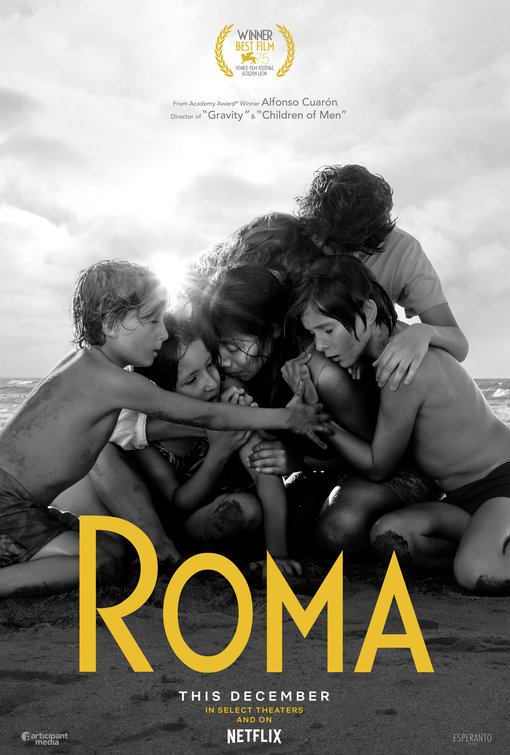Roma (2018)


SHOULD I SEE IT?
YES
Potentially a major player at the Oscars this year, Roma is a powerful, unforgettable and emotional experience.
Epic and vast, yet somehow intimate and introspective, Alfonso Cuarón’s film is a labor of love and he pours his talents as director, editor, writer, and cinematographer into every frame.
Yalitza Aparicio gives one of the year’s most powerful performances in her acting debut. As Cleo, a live-in housekeeper for a family in 1970 Mexico, her work here is going to be something I carry with me for a long time to come.
NO
The movie has a deliberate pace, focusing more on situations and experiences than a scene-to-scene conventional narrative. Some may find the approach tedious or tough to connect with.
The film’s scant few detractors have pointed to the film being ponderous and wandering, visually appealing but not saying much of anything of meaning. Clearly not my view, but that is a take from people who do not like the film.
Warning: The film depicts a realistic and unflinching sequence involving a health scare, specific to women, that is very difficult to watch.
OUR REVIEW
What is he looking for? What is he trying to find?
Watching Alfonso Cuarón’s deeply personal and semi-autobiographical Roma, my mind drifted more than once to those specific thoughts and questions. Few films probe memories and amplify self-reflection in such a selfless and giving way, a testament to Cuarón’s ability to hold your attention, pique your curiosities, and then steal you away into the world he is building right in front of your eyes.
Cuarón has his hands all over the film, a personal labor of love. He serves as director, screenwriter, co-producer, cinematographer, and shares editing responsibilities with a former editorial trainee, Adam Gough, he worked with on 2006’s Children of Men. Shot in gorgeous black-and-white, Roma retains a scrapbook or photo album-like quality, a glimmering series of snapshots brought to life.
Inspired by the director’s childhood, Roma begins in 1970 Mexico City. We settle in with a family consisting of physician Antonio (Fernando Grediaga), wife Sofía (Marina de Tavira), their four children, Antonio’s mother (Verónica García), maid Adela (Nancy García García), and live-in housekeeper Cleo (Yalitza Aparicio). As we observe their daily lives, Cuarón gives us a moment to see the role each individual plays within the family dynamic, before affixing his gaze upon Cleo.
Soon, this will become her story.
The family shares a close bond, a loyal dog who seems to defecate constantly in the driveway, but we start to see fissures emerging between Antonio and Sofía. As Antonio leaves for what the children believe to be a work trip, we recognize that this is different. Though she says very little, Cleo recognizes the family dynamic she has come to know is changing quickly.
The separation slides into the background as we see Cleo explore a relationship with a martial arts-obsessed boy, Fermín (Jorge Antonio Guerrero). She works tirelessly in support of the family and has a close bond with Adela. For awhile, Cuarón is content to just observe, but the film starts to become more of an exploration, with his camera mirroring a similar, quiet curiosity of Cleo’s introspective view of the world. We don’t learn a lot of Cleo’s backstory, but we are advancing in life with her, her live-in family, and events which lead to her needing to make big, life-changing decisions seemingly all on her own.

This is haunting, poetic, and a film impossible to forget. Again, I could not but wonder what Cuarón was searching for. In Aparicio, he has found a stunning discovery, a non-professional actor who allows her vulnerability and sensitivity to shine bright in every frame. The 24-year-old Aparicio, cast shortly after completing training to become a preschool teacher in Mexico, gives as honest and pure a performance as you will ever see. She provides the heart and soul of the film, conveying emotional power and depth many veteran actors struggle to achieve.
Cuarón is also exploring the Mexico City of his youth. He looks to the skies. He allows the natural sound to fill in the silence of everyday life. Oddities creep in, idiosyncrasies are allowed. He blends real-life events with fictionalized ones. A marching band seems to arrive in front of the family’s home at the most inopportune times. Fermín gets caught up with hooligans and we observe recreated moments from the infamous 1971 Corpus Christi Massacre, where student protesters were injured and killed by soldiers from the Mexican Army.
At 56 years old, Cuarón may be pondering a simpler time, but his remembrances sting and leave impact.
What is he looking for? What is he trying to find?
Through his affection for Cleo, inspired, in part, by his nanny from childhood, Cuarón feels like he’s trying to uncover the moment when life became somewhat less simple and a bit more complicated. Is there one or two defining moments, or a series of smaller ones, that nudge us and guide us towards a more realistic view of the world? As Cleo and her live-in family adapt and shift to changes in their lives, I could not help but wonder…
What moments set me on the path to become who I am today?
Without a doubt, Cleo is brave. Selfless. A woman who reminds us that kindness, tenderness, and compassion leaves an indelible impact on those who not only receive it, but put it out to the world. For Alfonso Cuarón, Cleo represents a bittersweet, emotional elegy to youth and she helps make Roma a lyrical, beautiful masterpiece.
CAST & CREW
Starring: Yalitza Aparicio, Marina de Tavira, Nancy García García, Verónica García, Fernando Grediaga, Jorge Antonio Guerrero, Andy Cortés, Diego Cortina Autrey, Carlos Peralta, Marco Graf, Daniela Damesa.
Director: Alfonso Cuarón
Written by: Alfonso Cuarón
Release Date: November 21, 2018 (theatrical); December 14, 2018 (Netflix)
Netflix
